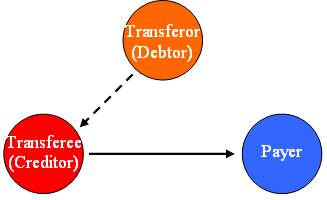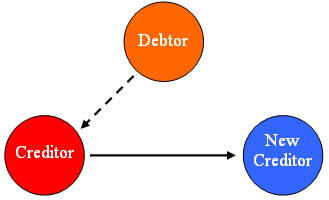Hawala is the assignment/ transfer of debt from one party (the assignor/ transferor or in Arabic al-muheel) to another party (the payer or in Arabic al-muhal alaihi). Hawala could also refer to the assignment/ transfer of right where a creditor is replaced with another creditor. The former form of hawala (debt transfer/ debt assignment or in Arabic hawalat-ul dayn) differs from the latter (right transfer/ assignment of rights or in Arabic hawalat-ul haqq) in that in the former a debtor is replaced with another debtor, while the latter involves the replacement of a creditor with another creditor. The contract of hawala is not a contract of sale (ba’i), as it is used to facilitate payments and debt recovery.
- Hawalat-ul dayn (debt assignment/ transfer): according to Hanafi jurists, it is the assignment/ transfer of the liability for a debt from the legal personality of the debtor to the legal personality of the liable person named in the contract. In this sense, an assignment/ transfer of debt is different from a guarantee contract in that the latter entails the conjoining of liabilities rather than the assignment/ transfer of liabilities. Therefore, once a transfer is legally made, the original debtor is relieved from repayment requests. In general, the assignor/ transferor is a debtor to the assignee/ transferee, where the debt gets assigner/ transferred to a third party (al-muhal elaihi or the payer) who becomes the new debtor. In this type of hawala, the debtor is the initiator of transfer. The following figure illustrates the relationship between the three parties involved in hawalat-ul dayn (hawalat al-dain):

- Hawalat-ul haqq (assignment/ transfer of rights): it refers to the assignment of right; a type of hawala which involves a substitution of one creditor in place of another with respect to the relationship with the debtor. If the established debt for which one debtor replaces another is a fungible item (mal mithli) recognized as a liability, then the assignment of debt is a valid assignment of rights (huquq- pl. of haqq) whereby the principal creditor is the assignor, and the ultimate creditor is the assignee. The assignor is a creditor to the assignee, where the debt gets assigned to a third party (al-muhal lahu or the receiver) who becomes the new creditor. In this type of hawala, the creditor is the initiator of assignment. The following depiction demonstrates the relationship between the three parties involved in hawalat-ul haqq.






Comments